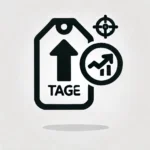Hey there, fellow digital explorers! If you’re here, you’re probably curious about how tags can transform your search engine rankings. Buckle up because we’re about to dive into the magical world of tags and how they can boost your SEO game. Plus, we’ll sprinkle in a bit of humor to keep things lively. Ready? Let’s go!
What Are Tags, Anyway? Before delving into the main topic, it’s crucial to understand the significance of tags. Tags can be likened to keywords or phrases that play a pivotal role in organizing and classifying your content. Essentially, they act as a metadata that conveys valuable information to search engines about the nature and subject of your content. Without these tags, your content might struggle to stand out in the vast digital landscape, making it less likely to be discovered by your target audience.
Before delving into the main topic, it’s crucial to understand the significance of tags. Tags can be likened to keywords or phrases that play a pivotal role in organizing and classifying your content. Essentially, they act as a metadata that conveys valuable information to search engines about the nature and subject of your content. Without these tags, your content might struggle to stand out in the vast digital landscape, making it less likely to be discovered by your target audience.
Tags vs. Categories
Categories are like chapters in a book, giving you a big picture of related stuff. And tags, well, they’re the specific things, like the index at the back of the book, pointing out the important topics in each chapter.
Why Should You Care About Tags?
You might be wondering, “Why should I bother with tags?” Tags are like the breadcrumbs that lead search engines (and users) to your content. Here’s why they matter:
- Improved Discoverability: Tags help search engines understand the context of your content, making it easier for users to find you when they search for related topics.
- Better User Experience: Tags make it easier for your audience to navigate your site and find related content, keeping them engaged and coming back for more.
- Enhanced Keyword Targeting: Using relevant tags allows you to target specific keywords, giving you a better shot at ranking for those terms.
- Content Organization: Tags help you categorize your content, making your site more organized and user-friendly.
 How Tags Improve Search Engine Rankings?
How Tags Improve Search Engine Rankings?
- Enhanced Indexing: Search engines use complex algorithms to index and rank web pages. When you use tags, you’re essentially providing additional data points that help these algorithms understand what your content is about. This improved understanding can lead to better indexing and, consequently, higher rankings. Imagine search engines as librarians. Tags act like catalog cards that help the librarian (search engine) know exactly where to place your book (content) on the shelf (search results). The more precise the card, the easier it is to find the book.
- Better Keyword Relevance: Tags allow you to emphasize specific keywords related to your content. When you tag your content with relevant keywords, search engines take notice and associate your content with those keywords. This can significantly improve your chances of appearing in search results for those terms. For example, if your blog post is about “email automation software,” using tags like “email marketing,” “automation tools,” and “digital marketing” can help search engines understand the relevance of your content to these keywords.
- Increased User Engagement: Tags help search engines and improve user engagement. Users who find relevant content quickly will likely stay on your site longer. This increased dwell time sends positive signals to search engines, indicating that your site is valuable and relevant. Longer engagement times can lead to higher search rankings. Think of it this way: if visitors are like guests at a party, tags are the helpful host that guides them to the best conversations and keeps them entertained. Happy guests are more likely to stick around and tell their friends, boosting your party’s (site’s) reputation.
- Improved Internal Linking: Tags can also enhance your internal linking strategy. You create a network of interconnected content by tagging related posts with similar tags. This helps users navigate your site and also helps search engines crawl and index your pages more effectively.
Internal linking is like building roads between towns. When towns are well connected, it’s easier for people (both users and search engines) to travel between them, making the region (or website) more prosperous.
Do Tags Need to Be No-Follow or Do-Follow?
Should you set tags to “no-follow” or “do-follow”? Generally, it’s better to go with “do-follow” because it helps search engines find and crawl your content more effectively. Using “no-follow” tags tells search engines not to follow the links, defeating the point of using tags to improve SEO. So, stick with “do-follow” tags to get the most out of SEO.
Case Study: How Tags Transformed Acme Corp’s SEO Strategy
Let’s take a look at a real-world example. Acme Corp, a mid-sized e-commerce company, needed help with its search engine rankings. Despite having quality content, their articles needed the visibility they deserved.
The Challenge
Acme Corp had plenty of great content but wasn’t adequately categorized or tagged. This made it difficult for search engines to understand and rank their content effectively. The user experience was also subpar, as visitors had trouble finding related content.
The Strategy
Acme Corp decided to revamp its tagging strategy. First, it conducted thorough keyword research to identify relevant tags for its content. Then, it tagged its existing posts with specific, relevant keywords.
The Results
Within three months, Acme Corp saw a significant improvement in its search engine rankings. Organic traffic increased by 40%, and visitors’ average time spent on the site also increased. The improved tagging strategy helped search engines better understand its content and made it easier for users to find related articles, enhancing the overall user experience.
How to Use Tags Like a Pro
Now that we know why tags are fantastic, let’s discuss how to use them effectively. Here are some tips to get you started:
1. Be Specific and Relevant
When choosing tags, be specific and relevant to the content of your post. Generic tags like “blog” or “post” won’t do much for your SEO. Instead, use tags that accurately describe the topic. For example, if you’re writing about “email marketing automation,” use tags like “email automation,” “email marketing tools,” and “automated email campaigns.”
2. Don’t Overdo It
While tags are great, it’s important not to go overboard. Too many tags can confuse search engines and make your content look spammy. Aim for 5-10 well-chosen tags per post. It’s quality over quantity, folks!
3. Use Long-Tail Keywords
Long-tail keywords are longer and more specific keyword phrases. They might not have as much search volume as shorter keywords, but they’re often easier to rank for. For example, instead of just using “marketing,” try “small business email marketing automation.”
4. Consistency is Key
Consistency is crucial when it comes to tagging. Use the same tags if you have multiple posts about the same topic. This helps search engines understand the relationships between your posts, ultimately increasing your site’s authority..
Tagging Best Practices
To ensure your tags are working their SEO magic, follow these best practices:
- Research Keywords: Use tools like Google Keyword Planner, SEMrush, or Ahrefs to find the best keywords to use as tags.
- Monitor Performance: Monitor your site analytics to see which tags drive traffic. This will help you refine your strategy over time.
Update Tags: Don’t set it and forget it. Review and update your tags regularly to keep up with changing trends and new content.
The Humor Angle
Let’s sprinkle in a bit of humor to keep things light. Imagine tags as the ultimate party planners for your blog. They invite the right guests (your readers), set up the best conversations (related content), and ensure everyone has a great time (enhanced user experience). Without tags, your blog party might end up like a middle school dance – awkward and under-attended.
Conclusion
Tags seem like a small detail, but they can significantly impact your search engine rankings. By being specific, using long-tail keywords, and staying consistent, you can harness the power of tags to boost your discoverability and keep your readers engaged.
So, next time you’re writing a post, give those tags the attention they deserve. Your SEO will thank you, and your content will shine like never before. Happy tagging!
And remember folks, in the world of SEO, it’s not just about working hard; it’s about working smart – with a dash of humor to keep things fun. Cheers to better rankings and more visibility!





